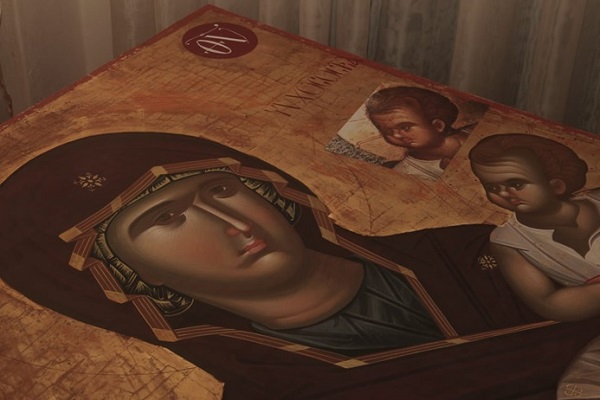‘Hail, city of the king of all’
27 March 2023Among the many wonderful salutations addressed by the hymnographer to our Lady, one stands out particularly for its symbolism and importance: ‘Hail, city of the king of all’.
This characterization of our Lady as ‘the city of God (the king)’ comes from the Prophet David: ‘the spate of the river gladdens the city of God; the Most High has sanctified his tabernacle’ (Ps. 45, 5). In this city, the inspired Fathers see the adumbration of our Lady, while Saint John the Damascan interprets the spate of the river as being the outpouring of the gifts of the Holy Spirit, which inundated the whole of her being and filled her with grace, even before the Lord Most High descended and overshadowed her with even greater grace.
This is why, centuries before these things occurred, David, hymned our Lady in the following terms: ‘Glorious things have been spoken of you, city of God’ (Ps. 86), as does the hymnographer of the Canon of the Akathistos Hymn, who says, in ode five: ‘Glorious things, worthy to be heard, are spoken clearly of you’.

In combination with the salutation of the hymn-writer, the interpretation of the above verses from the psalms helps us to penetrate the ‘mystery’ of the Mother of God and to understand how it was that the ‘nose-gay’ which perfumed the whole of nature attracted divine grace through its scent and thus became the vessel and Mother of God and the vehicle of our own salvation.
We really do owe a great debt of gratitude to our all-holy Mother because, from the time of her birth until the end of her earthly life, she was the ‘lamp of light’, the ‘shining star’ which was permanently directed towards the source of light, the never-setting Sun of Righteousness. So, illumined by his divine rays, she shone in the world with the beauty of her virginity, the purity of her soul, the cleanliness of her spirit and the virtuous way in which she lived her life.
Our Lady deserves our honor primarily, however, for the fact that she prepared herself to become the ‘vehicle of the Word’, even though she was unaware of God’s plan. Saint Nikolaos Kavasilas says that when the angel brought her the glad tidings concerning the birth of the Son of God, she never for a moment had any doubts about herself, that is, whether she was worthy of this, but only about how the laws of nature were to be overcome and a ‘maiden who had not known a man’ was to give birth. Once she was given the answer that this ‘inexplicable child-bearing’ was the work of the Most High, in conjunction with the Holy Spirit, she immediately gave her consent, as if she’d long been prepared.
So this young maiden from Nazareth, lowly Maria, became the spacious ‘palace’ of the, until then, home-less God, became the ‘city of the King of All’. This is her contribution to the task of salvation; and through her person the whole of humankind also participates. The devout maiden strove to remain pure and by her will did so, so that she could be receptive to divine grace and could continue to remain pure. Because, of course, the Holy Spirit can’t dwell in an unclean vessel; it first has to be cleansed.
So, in the fulness of time, the Lord came to dwell in his ‘city’, our all-holy Lady. Saint Gregory Palamas and other Fathers emphasize the fact that our Lady was already ‘full of grace’ long before the Annunciation.
The grace-filled maiden, later to be the Mother of God, was well-pleasing to God because of her virtuous way of life, and, pointing this out, Saint Nikodimos the Athonite appositely remarks that ‘all the evils of created things were not sufficient to distress God compared to the fullness of the sanctity of the Mother of God. She alone was able to please him in all things and through all things, because she alone was receptive enough and spacious enough to encompass all the natural, discretional and supernatural gifts that God had distributed throughout the whole of creation’.
Saint Nikodimos goes on to say: ‘Just as the bower is created in order for the tree to be planted, and the tree, in its turn, is planted for its fruit, in similar vein the whole of the conceptual and perceptible world was made for the Mother of God, and the Mother of God came into being for Christ’.
So if the Fathers pay such tribute to our Lady, shall we not also honor her fittingly? Not, of course, with words, since they’re not sufficient to hymn her majesty and glory, but with deeds. How exactly? In the way she showed us: cleansing the body with fasting, purifying the spirit with prayer, cultivating the garden of the soul with the virtues, and thus making our whole being capable of becoming the abode of God’s grace.
Just as God created paradise in order to offer us every good thing, so our Lady became the ‘animate paradise’ in order to provide an abode for the Son of God. She became ‘the city’, wherein lived Christ, the citizen of heaven and earth. Let us also desire to make our heart a ‘city of God’ and our life an earthly paradise which will open to us the path to the heavenly city and eternal paradise.
In order to succeed, let us set ‘all our hope’ on the Mother of our Lord, who became our Mother, too, as well as our Defending General. She’s our rampart and defence, our protection from every attack of the enemy and from all other disasters in our life.
Let us hold our Lady’s hand; she’ll guide us safely into the harbor of salvation, Christ, and into his heavenly kingdom. May all those who have striven attain this, with the help of God and the intercessions of his all-holy Mother. Amen






